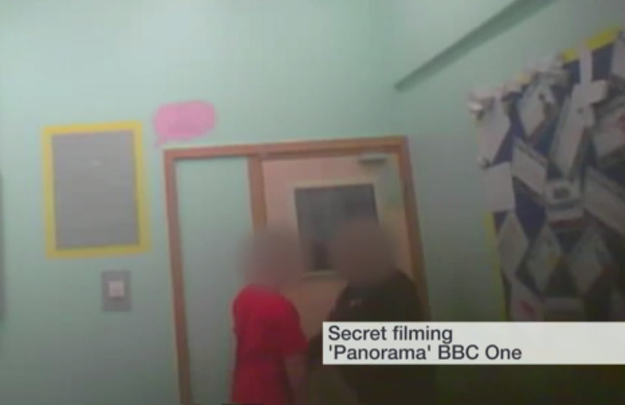
Staff at all G4S-run youth jails will now wear body-mounted cameras, BuzzFeed News has learned.
In his first interview following allegations of abuse at G4S’s Medway secure training centre, the company’s managing director of youth services, Paul Cook, said he had been “shocked and sickened” by the behaviour of the staff.
The BBC’s Panorama appeared to show guards at the private youth prison slapping an inmate, using unnecessary restraint techniques, and attempting to conceal their behaviour from CCTV cameras by standing under them. Five men have since been arrested and the director of the prison has resigned.
An investigation of the centre is currently being undertaken by Kent police and the local authority.
“I suppose the hardest part was to understand how nobody had picked it up,” Cook said, “and the fact the kids hadn’t complained about it, even though they’d complained about other things. We have all these safeguards in place, but none of them worked.”
However, BuzzFeed News understands that the company is unlikely to face severe financial penalties as a result of any allegations that the company reported. Its penalties appear set to run into the low thousands of pounds at most, in large part due to the framing of the contracts it holds with government.


When asked about this, Cook said the system was set up to encourage the reporting of incidents. The penalties, he said, were “levied predominantly on operational failures that impact on the running of the centre as a whole, rather than for specific incidents such as indiscipline or restraint”.
He conceded that “the financial penalties applied to operational failures are also relatively small when compared to the penalties for not reporting, which are much larger”.
He said the system was “unlikely to be understood” by most frontline staff members, and added: “When it comes to failures of staff behaviour or conduct, our view is that these are better dealt with through established performance management processes, for example by additional training or disciplinary action, rather than forming part of the contractual financial penalties regime.”
He added: “We need to allow [the staff] to do their job rather than being concerned with the penalties system.”
When it was put to him that the young people in the Medway centre might have been scared of the adult staff members who appeared to be abusing them, he said: “You could say that,” but added: “If you look at the background and upbringing of the young people they come from backgrounds where people don’t treat them very well and then it becomes an acceptable norm so they don’t see it as wrong.”

He said he wondered if staff had subsequently apologised to the inmates as a way to placate them, and said he wondered if G4S, along with the other bodies that are present on the site, including the Criminal Justice Inspectorate, the Youth Justice Board, and the children’s charity Barnardo’s, were asking the right questions of the young people in their care. “Should we be looking at a different way of questioning young people about the care they’re receiving – tell me what [a member of staff] did, did you talk to him, how did he speak to you?”
The Panorama documentary appeared to show staff members concealing their behaviour from static CCTV cameras. Cook said that staff members responsible “managing incidents” at all three of G4S’s youth jails would now wear body cameras. He said the move was not a direct result of the documentary, and that he was already planning to roll out the technology after a pilot that was being run at Rainsbrook secure training centre months before the BBC documentary aired.
Cook said he had “put safeguards around them for young people’s privacy so young people get told when they’re being switched on and off”.
“They’re generally switched on when there’s an incident about to happen, sometimes by switching them on the young person will desist," he said. "It also picks up the audio and if it does result in a restraint obviously you’re getting all the footage and you’re getting camera footage of areas that aren’t covered by static cameras."
Cook was asked if he recognised that there were warning signs at Medway before the Panorama documentary. Shortly after it aired, BuzzFeed News learned that an unspecified number of people were sacked from the centre in 2013 after members of staff called the children “fucking cunts” and fucking arseholes” on Facebook.
Cook said that “not all the people making the comments” were members of staff at Medway. He added that the comments had been brought to the company’s attention by its own staff before they first appeared in the media (in Private Eye magazine). “It was appalling behaviour and it was referred to us by our own staff,” he said.
He was also asked about the 2004 death of 15-year-old Gareth Myatt, who died after being restrained by three adult guards at Rainsbrook. The inquest into Myatt's death showed that restraint trainers had macho nicknames like “Crusher” and “Mauler”, but Cook said some of this information had been presented out of context at the inquest – he said the staff member known as “Clubber”, for instance, had been given that nickname because she liked going to nightclubs.
BuzzFeed News put it to Cook that the Howard League for Penal Reform’s lawyers had said complaints were not being upheld “often because of a lack of CCTV evidence corroborating the child’s version of events”.

Cook said the difficulty was with “data protection issues – often that doesn’t just relate to the client, there’s other people on the data.”
He said: “We have to abide by the rules – the issue is how difficult it is to pixelate the other stuff we’re looking at. Pixelating doesn’t always protect the privacy of young people.”
He added: “I’m always amazed with looked-after children how free they are with information about their lives, because they’re used to people questioning them about all sorts of things – social workers and psychiatrists – whereas you’d be a bit sensitive to me questioning you about things. We have to be careful and make sure it’s informed consent – and what do their parents think, and what do victims think? There’s a victim out there and they need some consideration too.”
However, in response to his comments, Andrew Neilson, director of campaigns at the Howard League, told BuzzFeed News: "G4S should not be withholding CCTV evidence from lawyers, who would never disclose such material to the public directly. We deal with confidential information all the time when representing children in custody. Indeed clients and their lawyers routinely review and see CCTV evidence in the course of prison disciplinary hearings and in respect to criminal matters without problems.
"Complaints to the Prisons and Probation Ombudsman can take a long time and early disclosure would help resolve issues quicker, rather than tie up cases in often years of investigation. While access to CCTV evidence remains important, the real point for G4S managers to address is simple: their staff should be properly trained and vetted and not hurt the children in their care."
In January the Financial Times reported that G4S was considering pulling out of the youth justice sector. BuzzFeed News asked the company if it had anything more to add on this story. It declined to comment.
